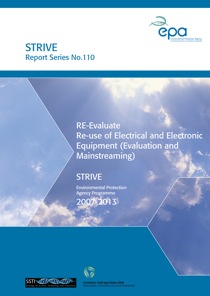STRIVE 110: Maurice O'Connell and Colin Fitzpatrick
Summary: Reuse is considered as a potential building block towards achieving more sustainable consumption of electrical and electronic equipment, covering environmental, economic and social dimensions.

Background
The recast of the WEEE directive has provided an opportunity to evaluate what role reuse might play in the sustainable management of e-waste in Ireland. A sustainable reuse sector should be environmentally friendly, be economically viable and contribute to solving societal challenges.
Key points
In the case of ICT, from an environmental perspective a large body of literature has been published which strongly supports the case for extending the usage phase of certain ICT equipment through reuse. Socially, second hand markets enable access to information technology, improving education and enabling business expansion. Economically, reuse generates employment and revenue, in both for-profit and non for profit organisations.
For white goods (washing machines, dishwashers, tumble dryers and refrigeration units) a quantitative model was developed to determine when it is beneficial to reuse an appliance compared to the purchase of a new appliance. This provides considerable certainty that a recommendation for re-use of all ‘A’ and‘B’ rated appliances will be sustainable.
Development of a reuse sector provides an opportunity to make a significant contribution to social and economic growth by creating employment and ensuring sustainable economic development. If Ireland were to achieve reuse rates comparable with European best practice it would translate to job creation in the order of several hundred.
Irish consumers’ willingness to buy second-hand electronics is similar to the attitudes found in the UK and Belgium where established reuse systems are in place.
Successful reuse enterprises in Ireland and abroad identified "access to equipment" as the key enabling factor for reuse. Retailers and distributors are identified as good sources for white goods, with kerbside collections potentially facilitating the spare parts inventory market. International case studies indicate significant reuse potential for white goods at civic amenity sites.
Technological developments within the EEE space with the inclusion of RFID transponders for enabling automated item level identification and the growing capabilities within the internet of things can potentially streamline the EOL process enabling the refurbisher identify WEEE with possible potential for reuse instantaneously at point of entry.
Findings/Recommendations
In this report, reuse is considered as a potential building block towards achieving more sustainable consumption of electrical and electronic equipment. In addition to environmental considerations, the concept of sustainability also includes the economic and social dimensions of re-use. The outcome of the research strongly supports the development of a WEEE reuse sector in Ireland.
Reuse is an activity that must be regulated in order to develop in a sustainable fashion, avoiding sham reuse and promoting consumer confidence. Only organisations operating to sufficiently high standards should be considered eligible to undertake refurbishment and reuse activities and be given access to WEEE. An independent body with regulatory authority is proposed to ensure that only refurbishers who are recognised to be operating to the designated standards will be in a position to access supply and to have their activities reported as official re-use.
For Further Information
Contact Dr. Colin Fitzpatrick (Department of Electronic & Computer Engineering, University of Limerick, Limerick, Ireland – Colin.Fitzpatrick@ul.ie)
https://www.epa.ie/media/archive/research/research-thumbnails/STRIVE_110_thumb.jpg